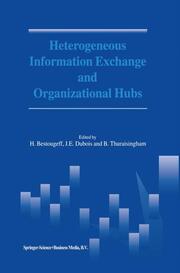Detailansicht
Heterogeneous Information Exchange and Organizational Hubs
ISBN/EAN: 9781402006494
Umbreit-Nr.: 1481764
Sprache:
Englisch
Umfang: x, 243 S.
Format in cm:
Einband:
gebundenes Buch
Erschienen am 30.06.2002
- Zusatztext
- Helene Bestougeff, Universite de Marne Ia Vallee, France Jacques-Emile Dubois, Universite Paris VII-Denis Diderot, France Bhavani Thuraisingham, MITRE Corporation, USA The last fifty years promoted the conceptual trio: Knowledge, Information and Data (KID) to the center of our present scientific technological and human activities. The intrusion of the Internet drastically modified the historical cycles of communication between authors, providers and users. Today, information is often the result of the interaction between data and the knowledge based on their comprehension, interpretation and prediction. Nowadays important goals involve the exchange of heterogeneous information, as many real life and even specific scientific and technological problems are all interdisciplinary by nature. For a specific project, this signifies extracting information, data and even knowledge from many different sources that must be addressed by interoperable programs. Another important challenge is that of corporations collaborating with each other and forming coalitions and partnerships. One development towards achieving this challenge is organizational hubs. This concept is new and still evolving. Much like an airport hub serving air traffic needs, organizational hubs are central platforms that provide information and collaboration specific to a group of users' needs. Now companies are creating hubs particular to certain types of industries. The users of hubs are seen as communities for which all related information is directly available without further searching efforts and often with value-added services.
- Autorenportrait
- InhaltsangabeIntroduction. Part I: Heterogeneous Database Integration: Concepts and Strategies. 1. Integration Methodology for Heterogeneous Databases; G. Salzano. 2. On Transactional Issues in Federated Information Systems; E. Rodríguez, F. Saltor. 3. Semantic Integration in MADS Conceptual Model; A. Sotnykova, et al. 4. TIME: A Translator Compiler for CIS; C. Nicolle. 5. An Implementation of Database Integration Strategies; K. Da Silva Scopim, et al. Part II: Data Warehousing: Models and Architectures. 6. An Architecture for Data Warehouse Systems Using a Heterogeneous Database Management System - HEROS; D. de S. e Silva, et al. 7. Developing an Active Data Warehouse System; S.-M. Huang, et al. 8. Building Secure Data Warehouse Schemas from Federated Information Systems; F. Saltor, et al. 9. Conceptual MetaCube - Metadate for Multidimensional Cube; N. Thangh Binh. 10. Integration of Keyword-Based Source Search and Structure-Based Information Retrieval; G. Suzuki, et al. Part III: Sharing Information and Knowledge Discovery. 11. Knowledge Management for Heterogeneous Information Exchange; B. Thuraisingham, et al. 12. The Exchange of Data in the Global Market. How to Avoid a Tower of Babel; A. Moreno. 13. Knowledge discovery in Heterogeneous Environments; M.N. Kamel, et al 14. Heterogeneous Information Exchanges in the Construction Industry. The SYDOX/MATCOMP/Xi Prototype; A.-F. Cutting-Decelle, J.-E. Dubois. 15. Databases and Design: Discovering New Ideas in Old Facts;S. Iwata. Index.
